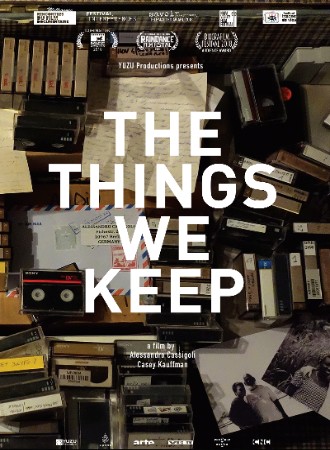
The Things We Keep 2017
Distributed by Passion River Films, 154 Mt. Bethel Rd., Warren, NJ 07059; 732-321-0711
Produced by Christian Popp
Directed by Alessandro Cassigoli and Casey Kauffman
Streaming, 75 mins
General Adult
Interpersonal Relations; Mass Media
Date Entered: 04/07/2020
Reviewed by Brian Falato, University of South Florida Tampa Campus LibraryAlessandro Cassigoli was an aspiring filmmaker in Florence, Italy looking for a flatmate. Casey Kauffman, an American raised in Florence, became the flatmate and eventually Cassigoli's closest friend. When Kauffman got a job as a reporter for Al Jazeera network in Qatar, the two parted, but a film idea would be generated.
Cassigoli moved to Germany and worked as a director of documentaries for German television. He and Kauffman would exchange "video postcards." When Kauffman sent footage of a story he worked on for Al Jazeera, Cassigoli wanted to see more. Kauffman was a one-man reporting unit and did all his own videography and sound recording. He sent his friend all the cassettes of his raw footage beginning in 2002 and continuing until 2017. What Cassigoli originally envisioned as a short film about Kauffman and his work became a 75-minute personal film that not only uses some of Kauffman's raw footage but also explores their lives and relationships.
Cassigoli narrates in English, but lets Kauffman take over a large portion of the movie with his footage. Kauffman is seen in stories from the Gaza Strip, Africa, and the U.S. The stories touch on important social issues. In Gaza, a critically ill Arab child must get to Israel for treatment, but the trip is thwarted by the massive paperwork required, and the child dies before receiving the treatment. In Mali in West Africa, Kauffman talks to East Africans who paid to be smuggled to Europe to get greater economic opportunities but are stuck in Mali, unable to get to Europe or back to their homes. In the U.S., Kauffman visits a shelter in Detroit for homeless families and strikes up a friendship with a young girl there, even giving her reporting tips. But, as he tells Cassigoli, who accompanied him, a reporter comes to a place to do a story, but then vanishes when the job is done, leaving behind the people he had interacted with.
Although issues are brought up, this is not an activist film. The political is refracted through the personal story of the two men. Since Kauffman worked in areas that could erupt in warfare, I thought this might be a tribute to a friend who had died while working as a reporter. But it's not as dramatic as that. The film is a tribute, not a memorial. There's even a happy ending.
I wouldn't make this an essential purchase, but Kauffman and Cassigoli are an engaging pair and the stories are interesting. The title is recommended as a supplemental purchase for large collections in journalism and film.